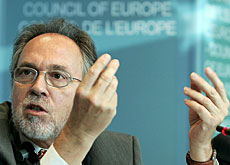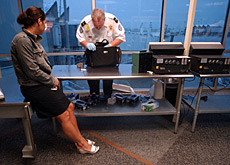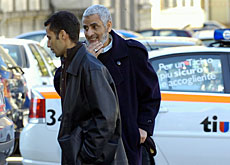Marty slams “injustice” of UN blacklists

Dick Marty has criticised the United Nations Security Council for blacklisting individuals suspected of having links to terrorism without evidence of any wrongdoing.
The Swiss investigator, speaking on the fringes of a Council of Europe conference, “Why terrorism?”, accused the Security Council of flouting its own principles and said the blacklisting discredited the international fight against terror.
The foreign ministry told swissinfo it would not comment on Marty’s remarks, made in Strasbourg on Wednesday, but it underlined that the multilateral framework constituted an important pillar in Switzerland’s efforts to fight terrorism.
According to Marty, the process of blacklisting – in which individuals have their assets frozen and are banned from travelling – is carried out behind closed doors by a New York-based committee, the “1267 committee”, at the request of Security Council members.
He said that those blacklisted are not informed or given a chance to be heard, and there is no appeal. The list currently contains 362 individuals and 125 companies or organisations.
The Council of Europe Parliamentary Assembly reported that Marty described the UN’s current blacklisting procedure as a “flagrant injustice” and a “dangerous ongoing erosion of fundamental rights and freedoms, even within the instances mandated to protect and promote them”.
Marty also announced that he would be extending his inquiry to a similar system of blacklists run by the European Union.
He said there were 26 individuals and 28 organisations on the EU list, ranging from the Afghan Mujahideen and the Palestinian Islamist group Hamas to Basque separatists ETA.
Government reaction
Carine Carey, a spokeswoman for the Swiss foreign ministry, told swissinfo the government took the view that the development of binding instruments against terrorism should not be undertaken by the Security Council alone, but should include all member states.
This was in order to satisfy the needs of the international community with respect to a coordinated and effective long-term approach, she said.
Carey added that the Swiss government believed that fair and clear procedures for listing individuals and entities and for removing them from the sanctions lists would contribute to the effective implementation of sanctions by UN member states.
And although some measures had been taken by the Security Council, Switzerland believed more needed to be done, she said. The possibility for a person to launch a delisting procedure before an independent panel remained a condition for an equitable process.
Swiss involvement
In a preliminary report made public this week, Marty cited the example of Youssef Nada, a successful Swiss-based businessman whose assets have been frozen and who has been barred from leaving the country since 2001.
An Italian national of Egyptian origin and a Muslim, he was suspected of having funded the September 11 attacks, even though a subsequent four-year inquiry by Swiss prosecutors failed to find any evidence.
Marty pointed out that three permanent members of the Security Council – France, Russia and Britain – were members of the Council of Europe and were therefore bound by the European Convention on Human Rights, which guarantees the right to a fair trial, including the right to be heard.
swissinfo with agencies
The attacks against the US in September 2001 marked a turning point in the war against terror.
In 2002, Bern and Washington signed a judicial aid agreement known as the Operative Working Agreement (OWA) to facilitate investigations into the 9/11 attacks.
A new accord agreed in March 2007 covers police cooperation in the fight against terrorism in general and its financing.
It is to complement a 1973 treaty on judicial assistance in criminal matters.
Efforts to negotiate a free trade accord with the US failed in 2006, but both sides approved the creation of a US-Swiss trade and investment cooperation forum.
Dick Marty, a Swiss senator, was appointed by the Council of Europe in November 2005 to investigate claims that the CIA had set up secret prisons in eastern Europe.
In his report published in June 2006 he concluded that 14 European countries had colluded with the US in a “spider’s web” of human rights abuses. He said other countries, including Switzerland, had been involved actively or passively in the detention or transfer of unknown persons.

In compliance with the JTI standards
More: SWI swissinfo.ch certified by the Journalism Trust Initiative












You can find an overview of ongoing debates with our journalists here . Please join us!
If you want to start a conversation about a topic raised in this article or want to report factual errors, email us at english@swissinfo.ch.